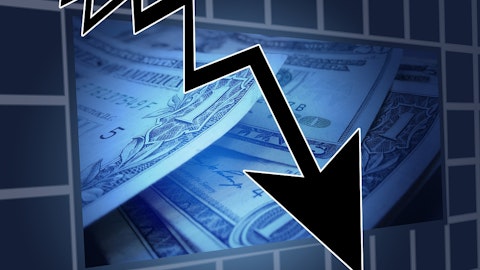So that’s really positive in my mind. On the wind side, I think we’re still seeing a little bit of dynamics that shaped up as a result of the tax credits that we originally we and the industry – thought were going to phase down after 2020. So we saw a significant amount of pull forward of demand. And I think that’s still affecting the industry a little bit and then, obviously, the PTC being extended for solar significantly improved the economics from a relative standpoint, which has been super positive for demand. We still see a lot of geographies where wind is incredibly attractive and so I feel good about long-term demand for wind and I also feel really good about long-term demand for repowering projects. Obviously, we had a great start to the repowering initiative following the IRA extension with over 700 megawatts we talked about today.
Obviously, its share for a year, it’s a little bit less than that, but when you look across the entire tens of gigawatts now of renewable projects, there’s lots of opportunities to repower as well. So overall, across the board, really excited about the opportunities that we have in front of us.
Carly Davenport: That’s great. I appreciate the color.
Operator: Our next question comes from Andrew Weisel with Scotia Bank. Please go ahead.
Andrew Weisel: Hey, good morning, everyone. First, a question. Can you talk a bit about supply chains? I’d be curious your latest thoughts on the availability and status of supply chains, both for solar equipment as well as for grid-level equipment like transformers or switchgears?
John Ketchum: Sure. Yeah, let me take that, Andrew. So, first of all, with supply chain, things are really improved a lot. As Rebecca just mentioned, we have the two issues, right? CERC convention, which has been asked and answered, provided a lot of clarity around what can be done, what can’t, and with the Presidential Proclamation. So, in very good shape there. Second was forced labor and making sure that our suppliers are working constructively with Customs and Border Patrol to get their panels cleared for importation into the country. And so, for the most part all of our solar suppliers have been able to do that and so, we are in very good shape there. I think on grid power, I actually the grid-level issues that you just mentioned, we’re in very good shape on.
We had gone long on grid-level equipment, including transformers and so, we have a significant supply in our inventory and we’ve also looked forward in a plan for this in terms of trying to make sure that we have equipment available where if our customers or the transmission owner in the places that we’re building renewables are short on equipment, are short on grid-level equipment in particular, that we have it in our inventory and are able to offer that up as a solution. And I think one of the big benefits that we have, given our scale and given our leverage and the ability to buy this equipment in very large quantities and really lock up a lot of the manufacturing lines for this equipment, it’s a true competitive advantage for a renewable business the way I think about it.
Andrew Weisel: Great. Just to clarify, NIR [ph] is buying this equipment, or FPL? Like, do you keep those separate inventories?
John Ketchum: Both are. Both are because both need it.
Andrew Weisel: Okay, great. And one quick follow-up, if I may, I’m almost apologizing to bring this up. But the Florida State Supreme Court asked the PSU for some details on their approval of the rigged case settlement. Can you just share your expectations around timing of the process and maybe potential outcomes?
Armando Pimentel: Hey, Andrew. It’s Armando. You’re right that the Supreme Court remanded the settlement agreement back to the Public Service Commission. Our view is that the Public Service Commission is going to take that up soon and will likely be in a position early next year, I would say first quarter of next year, to be able to send that back up to the Supreme Court with the additional details that the Supreme Court is looking forward to receiving. That process would be very similar to the process, both the timeline and the materials that the Public Service Commission went through with the Duke case that was remanded by the Supreme Court back to the Public Service Commission last year, where the Public Service Commission did not reopen the record.
We don’t expect our record to be reopened and made sure that they put together a conclusion that would be satisfactory in their view with the Supreme Court and send it back to the Supreme Court. So we think we’re on the same process as that Duke case was, and we look forward to having the Public Service Commission resubmit that, again, first quarter of next year.
Andrew Weisel: Sounds good. Thank you.
Operator: This concludes our question-and-answer session and the conference has also now concluded. Thank you for attending today’s presentation. You may all now disconnect.
Follow China North East Petroleum Holdings Ltd (NYSE:NEP)
Follow China North East Petroleum Holdings Ltd (NYSE:NEP)
Receive real-time insider trading and news alerts





